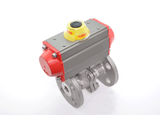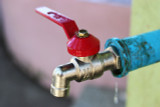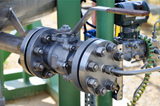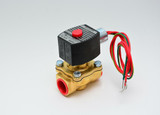2 Way Valves - page 5
Sub Category
Our Posts
View AllUnderstanding Valve Sizes and Measurement
Sizing the appropriate valve is critical to ensuring the performance of your system. Whether you'r …
Read MoreTypes of Water Valves
Hey there, fellow valve enthusiasts! We all know that valves play a crucial role in regulating th …
Read MoreValve inspection - main points of valve testing in Manufacture setting
Industrial facilities rely on different types of valves (such as check valves, for example) to con …
Read MoreTypes of Ball Valves
Ball valves are important components in a vast range of systems, from small family-owned workshops …
Read MoreWhat is a Backflow Preventer, and How Does it Work?
When a simple check valve is inadequate for the job, you need a backflow preventer. But knowing …
Read MoreUnderstanding valve standards and specifications
Hey there, fellow valve enthusiasts! Today, we're looking at valve codes, standards and specificatio …
Read MoreHow to Tell if a Valve is On or Off
We have all been there before. You are staring at a valve; you know that you should know if it is of …
Read MoreUnderstanding Different Types of Valve Connections and Fittings
Hey there, fellow valve enthusiasts! We know valves play a crucial role in regulating the flow of li …
Read MoreTypes of Valve Handles: Lever and Handwheels
Whether you're involved in industrial work, plumbing, or you're a DIY enthusiast, you come across va …
Read MoreThe Basic Parts of a Valve
Valves quietly work in many different areas, even places you wouldn't expect. They're truly every …
Read MoreGas Ball Valves In Industrial Applications - 5 Things to Keep in Mind
Unlike the standard ball valves, most gas ball valves are tested and approved by CSA. These valves a …
Read MoreHow To Correctly Use A 3 Way Valve In Different Applications
To understand the "T"-port and an "L"-port 3-way valves and what makes them different, it's importan …
Read MoreIndustrial Ball Valves - 9 Questions To Make The Right Choice
Ball valves are versatile flow control devices suitable for extensive industrial applications. They …
Read MoreEverything you need to know about valve types
Valves play crucial roles in production lines and equipment performance across a multitude of indust …
Read MoreWhat is a Duty Cycle and How Does it Relate to Electric Ball Valves?
Electric actuation improves the efficiency of processes by maintaining the accuracy of the re …
Read MoreActuated Butterfly Valves 101: All You Need To Know About Their Application In Piping Systems
Butterfly valves are quarter-turn flow control or isolation devices, used for quick shut-off in p …
Read MorePractical Guide To Electric and Pneumatic Actuators – Which One To Choose?
While electrical and pneumatic actuators have several unique benefits and are preferred in differ …
Read MoreHow Do Check Valves Affect Water Pressure in the Piping System?
Check valves also known as "one-way" valves are autonomously operated unidirectional valves that all …
Read MoreUsing an Actuated Ball Valve Or a Solenoid Valve For Best Fluid Control In The System
Both ball valves and solenoid valves serve a wide variety of applications. From a 3 way b …
Read MoreWhat are the types of solenoid valves?
Favored for offering low power consumption, a compact space envelope, superior speed of ope …
Read More


















